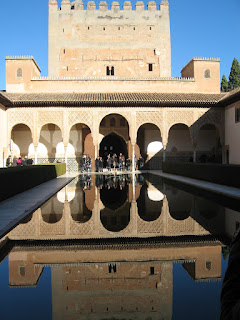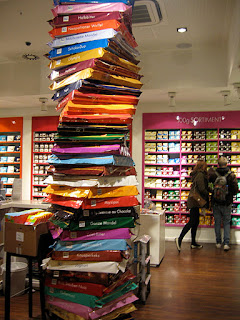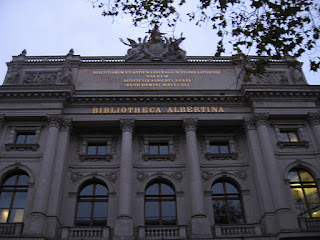Wednesday, December 21, 2011
Interlude
Saturday, December 10, 2011
Auf Wiedersehen
Wednesday, December 7, 2011
Geschichte
Sunday, December 4, 2011
the other Germany(s)




Tuesday, November 29, 2011
Córdoba (part 2)
Friday morning, the Berlin team presented our panel Islam as a Religious Minority in Germany: 50 Years after the Labor Recruitment Deal between the BDR and Turkey, followed by presentations from the Paris, Florence, and Moscow centers. The panels were completely interesting and engaging and it was such an incredible feeling to be amongst such talented peers. After the sessions, we had lunch in the Jewish quarter and began our tour of the city. We began with the Mezquita - the Great Mosque turned Cathedral. From there, we meandered through the streets to the Jewish quarter and saw the house where Maimonides might have lived and went to the Casa de Safrad; the Jewish museum and Syngagogue.




Córdoba (part 1)
The Berlin team arrived in Madrid and made our way down to Córdoba early on Thursday morning. After settling into our hotel, we got the chance to wander around the beautiful city before the conference began. Córdoba was unbelievably gorgeous and the plentiful orange trees ripe with fruit gave the air a distinctly sweet and citrusy scent, which made it all too easy to settle into vacation mode. We explored quaint side streets and finally made our way to lunch - tapas, of course - before heading back to the El Conquistador hotel to prep for the afternoon sessions.
The workshop officially began with welcomes from people from Stanford at Stanford (what up, Vice-Provost Elam!) and a panel of the professors who accompanied us on the trip. The Madrid team provided us with a new perspective on the term Convivencia and then it was time for dinner! Once Helen Bing (of Bing Program fame) realized there are really no turkeys in Spain, had some brought over from the US for our Thanksgiving consumption. Ridiculous, yes, but a kind gesture nonetheless. I know that my mother, for one, will ask what I ate for Thanksgiving, so for your pleasure, I stole a menu from the evening.
Berenjenas con Miel de Cana: eggplant with sugarcane honey
Panche de Verduras Naturales a la Plancha: grilled vegetables
Pavo Asado con Frutos Secos, Salsa de Frutos Rojos y Boniatos Asados: turkey cordobese with dried fruit and nuts, and sweet potatos)
Tarta de Calabaza: pumpkin tart with cinammon scented whipped cream
YUM TIMES 50.
Despite the fact that everyone was too full to move after dinner, we were whisked away by the BOSP staff and went through the old city to watch a traditional Andalucian Flamenco performance. Having studied flamenco for a very short period of time, I loved being able to see short snippets of my training mixed in with the Spanish flair and general sassiness of these amazing dancers. After the show, we headed back to the hotel and I promptly crashed in preparation for my presentation the next morning.
See part 2 for the rest of the story!
Sunday, November 20, 2011
a turkey tradition
Wednesday, November 16, 2011
Dad takes on Berlin!
- Museums and Art: The Pergamon, the Jewish Museum, c/o Berlin (a photography museum), Zentrum Judaicum, KW (a modern art museum), and gallery hopping on Auguststraße
- Sights and activities: the East Side Gallery, the Neue Syngagogue, hiking to the top of the Französische Dome, Gendarmemarkt, Alexanderplatz, the Brandenburger Tor, walks down Unter den Linden, and the Staatsballet's rendition of "Oz: The Wonderful Wizard,"
- Shopping and restaurants that are not normally in my 12 Euro/day budget (a.k.a, all restaurants with entrees over 8 Euro - a.k.a all restaurants that actual people would want to eat in).
- Plenty of time to chill/walk/ride the S-Bahn with my Abba.




Thursday, November 10, 2011
Deutsch 101: Grammatik
German Definite Articles | |||||
| masculine | feminine | neuter | plural |
|
Nominative case | der | die | das | die | the |
Accusative case | den | die | das | die | the |
Dative case | dem | der | dem | den | to the |
Genitive cases | des | der | des | der | of the |
German Indefinite Articles | ||||
| masculine | feminine | neuter |
|
Nominative case | ein | eine | ein | a, an |
Accusative case | einen | eine | ein | a, an |
Dative case | einem | einer | einem | to a, to an |
Genitive cases | eines | einer | eines | of a, of an |
I invite you to teach yourself German so that we can converse auf Deutsch (don't even get me started on prepositions) upon my return to the States. I keeping thinking/praying/wishing that one day I will wake up and simply speak German - don't worry, if that ever happens you'll know, as I will sing it from the rooftops!! Alas...I now solemnly swear to never complain about German again.*
*out loud.









